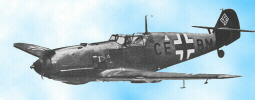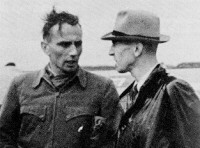Born: 26
June 1898, Frankfurt, Germany
Died: 15
September 1978.
Education: Technische Hochschule of Munich.
Willy Messerschmitt was a German designer and manufacturer of aircraft.
The distinguished forebears of Willy Messerschmitt included artists, scientists and poets. His branch of the family were wine merchants in Bamberg.
His interest in engineering
was evident at an early age. As a teenager, Messerschmitt built flying
models and later, he built hang gliders. He met the architect, Friedrich
Harth, who had already successfully designed and flown gliders. This convinced
Willy Messerschmitt to pursue a career in aeronautics.
 |
|
| The Bf 109E-3, which entered production in late 1939, was the standard Luftwaffe at the time of the "Battle of Britain", and was built in greater numbers than any other E-model. (source) |
Later, with financial assistance from his elder brother, he set up his own aircraft manufacturing business. His success in designing sporting aircraft soon made his name familiar in aeronautical circles.
When the Nazi party seized power in 1933, he designed the Bf 109. In 1938 the company became the Messerschmitt-Aitken-Gesellschaft, producing military aircraft. His Me109 set a world speed record at 481mph (1939).
This legendary Messerschmitt
Bf. 109, the Luftwaffe's foremost fighter, remained in production throughout
the Second World War with more than 33,000 aircraft made. Other designs
included the Me 323, a 6-engined transport capable of
carrying 18 tons
and the Me 410, a fighter-bomber. In 1944, Messerschmitt's company also
produced the Me 262, the world's first jet fighter flown in combat, and
the Me 163 Komet.
 |
|
| Fritz Wendel (left), after piloting the Me262's maiden flight, debriefing with Willy Messerschmitt. (source) |
By the end of World War II, Germany had lost the war, his factories were devastated, and Messerschmitt was arrested in 1945. Subsequently, he was tried in a Nazification court in 1948, found to be a "reluctant beneficiary" of the regime and was forbidden to design aircraft.
Messerschmit rebuilt his company as a manufacturer of pre-fabricated houses, sewing machines and motor scooters. He was later employed to design jet aircraft for the Spanish and Egyptian governments.
By 1958, Messerschmitt had returned to his life long love of making aircraft, with NATO contracts for co-production of aircraft.
Between 1968 and 1969, as a result of mergers, the conglomerate Messerschmitt-Bolkow-Blohm GmbH was built. This company manufactured aircraft, missiles, spacecraft, railroad vehicles and highway vehicles, and for the rest of his career, Messerschmitt was honorary chairman.
He died on 15 September 1978, leaving his personal fortune to be used for the restoration of cultural monuments in Europe.